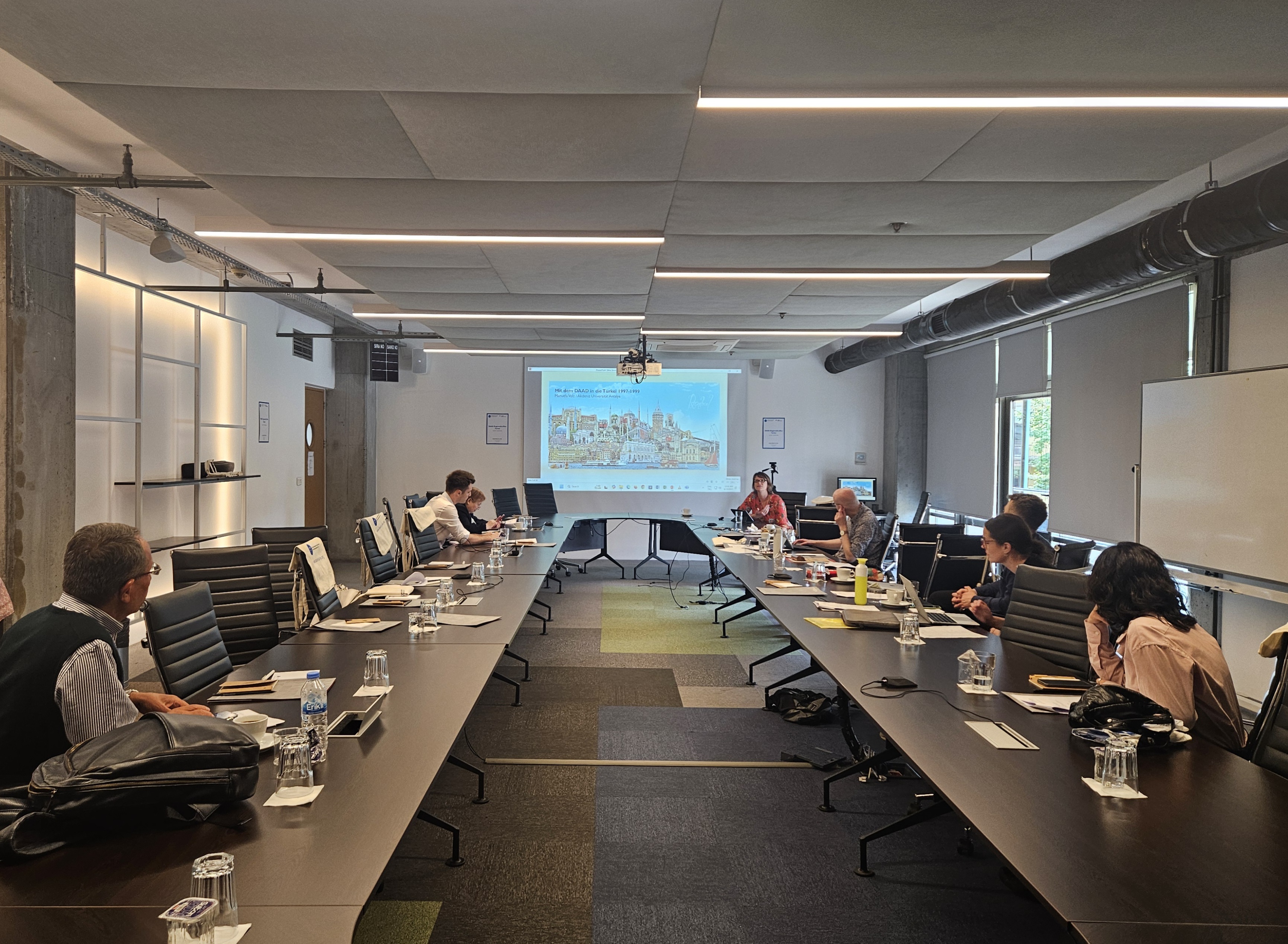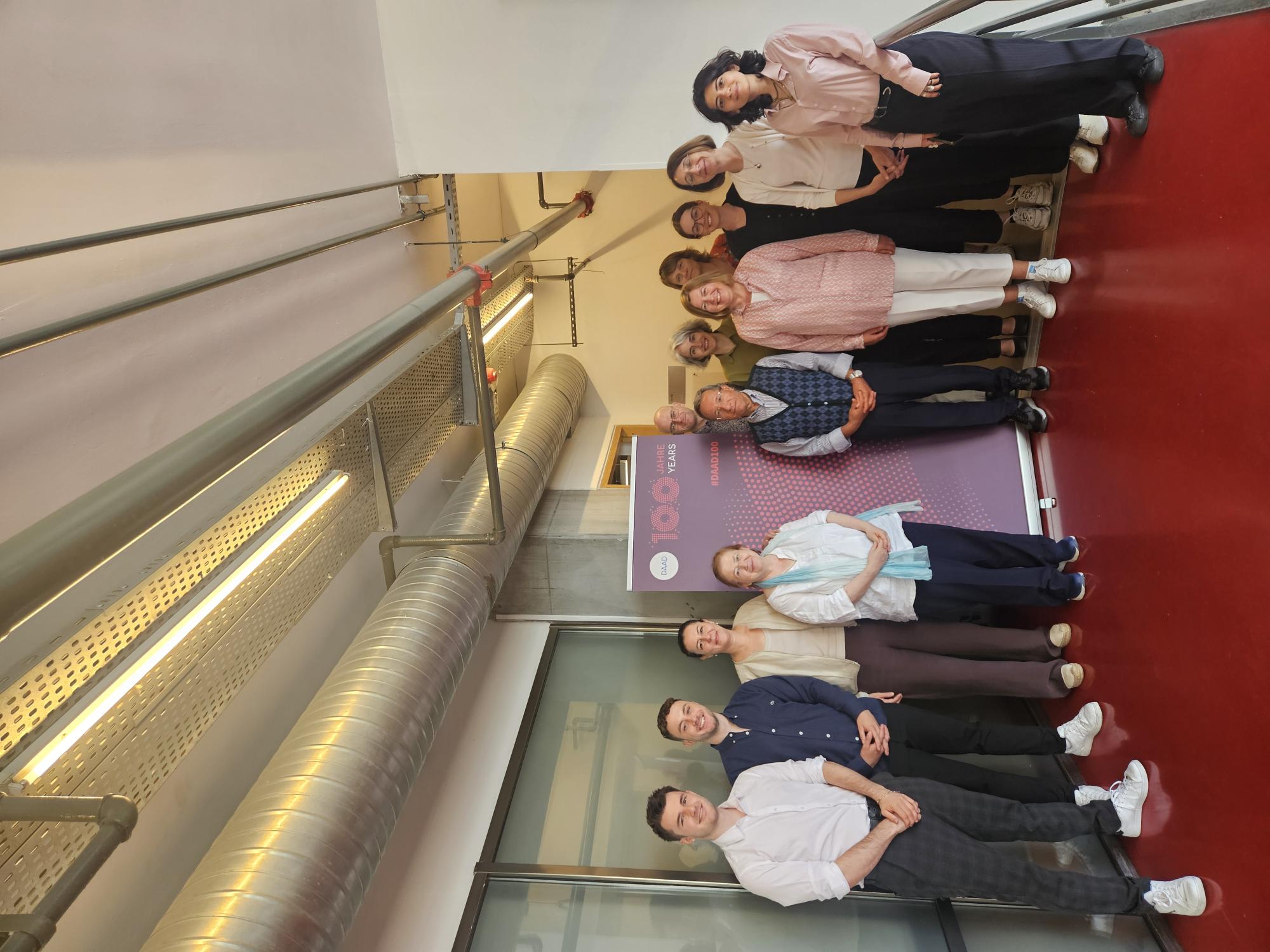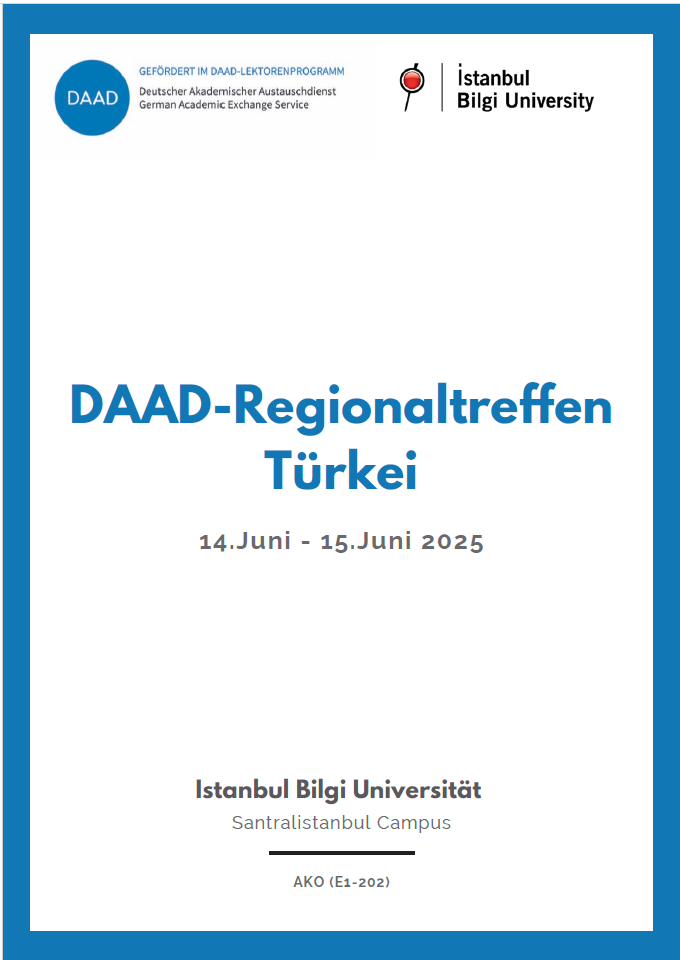German–Turkish Scientific Cooperation and Cultural Exchange: The Turkey Regional Meeting 2025 as Part of the DAAD’s 100th Anniversary Celebrations
30.6.2025
From June 14 to 16, 2025, the DAAD Turkey Regional Meeting was held at Istanbul Bilgi University. Participants included DAAD lecturers and teaching assistants from across Turkey, DAAD alumni, representatives from partner institutions, and delegates from the German Academic Exchange Service (DAAD) in Bonn. The European Institute of Istanbul Bilgi University was also actively involved in the organization and implementation of the event.
 The event was opened by Dr. Nilgün Yüce, DAAD lecturer at Ege University in Izmir, with a warm and inspiring speech. She emphasized the importance of the meeting for exchange and networking and thanked Eva Borhau in particular for her commitment and support during the application process. She then moderated the first panel of the conference, which focused on scientific cooperation.
The event was opened by Dr. Nilgün Yüce, DAAD lecturer at Ege University in Izmir, with a warm and inspiring speech. She emphasized the importance of the meeting for exchange and networking and thanked Eva Borhau in particular for her commitment and support during the application process. She then moderated the first panel of the conference, which focused on scientific cooperation.
Prof. Dr. Gonca Günay, Vice President for Research at Istanbul Bilgi University, warmly welcomed the participants and highlighted the close and trusting collaboration with the DAAD, emphasizing the long-standing cooperation between Istanbul Bilgi University and the DAAD.
Antje Schlamm-Götze, head of the DAAD’s ST21 department for Central and Eastern Europe, Southeastern Europe, Southern Europe, and Turkey, joined online and presented current DAAD funding programs. She emphasized the importance of mobility and international exchange as well as new initiatives to intensify cooperation between German and Turkish universities. In particular, she emphasized support for early-career researchers and alumni networks, stressing the importance of tailorin g programs to local needs.
g programs to local needs.
Dr. Ozan Kuyumcuoğlu, Vice Director of the European Institute at Istanbul Bilgi University, presented cooperative efforts in European Studies, especially the joint master’s program with the European University Viadrina in Frankfurt (Oder), Germany. He outlined the various perspectives of bilateral collaboration and underscored the importance of internationalizing study programs. He also referred to the DAAD lectureship at the European Institute, which has accompanied and strengthened this cooperation for years.
An overview of current DAAD activities in Turkey was provided by Elvan Yılmaz Gümüş from the Information Centre (IC) Istanbul, together with her colleague Murat Kemaloğlu. She presented updated statistics on scholarship distribution and introduced various funding programs, including DAAD scholarships for master’s and doctoral programs, exchange schemes, and specific funding for young researchers.
In the scientific cooperation panel, Prof. Dr. Sevinç Hatipoğlu (Istanbul University-Cerrahpaşa) presented a joint project with the University of Paderborn, Germany, which investigates the use of narrative videos in literature didactics. The project, titled "EliK – Explanatory and Instructional Videos in an International Context," aims to promote educational innovation through digital teaching tools. Prof. Hatipoğlu also introduced additional current collaborations.
Dr. Deniz Güneş Yardımcı (Istanbul Bilgi University) presented the DAAD and TÜBİTAK- funded bilateral research project with the University of Duisburg-Essen, titled “Distant Neighbours – Political Narratives and Visual Culture in German–Turkish Relations.” She emphasized the many opportunities such projects offer not only for scientific collaboration but also for cultural exchange between Germany and Turkey. The project serves as a successful example of interdisciplinary cooperation with impact beyond academic boundaries.
In the evening, participants gathered for a shared dinner at the Barba Vasilis restaurant in Fener. The relaxed atmosphere provided an opportunity for in-depth reflection on the day’s topics. The informal setting enabled a richer discussion on the role of scientific cooperation and prospects for bilateral engagement.
On the second day, the focus on university cooperation continued with a presentation by Prof. Dr. Mahmut Karakuş (Istanbul University), who introduced the German Studies Institutional Partnership (GIP) with the University of Hamburg. He highlighted the close academic collaboration and the mobility of students and faculty. The GIP encompasses joint research projects, courses, and workshops. Topics include narratives of migration and remigration in Turkish and German–Turkish film and literature, as well as multilingualism in films, texts, and urban spaces.
As part of the "100 Years of DAAD" anniversary, a panel with alumni contributions followed. Prof. Dr. Canan Şenöz Ayata, professor at Istanbul University and chair of the German–Turkish Cultural Advisory Board, gave a personal and impressive account of her nearly forty years of academic exchange experience with Germany. Using old invitation letters and photos, she retraced her journey as a DAAD-funded scholar. Her presentation was both informative and touching.
Following that, Manuela Volz, DAAD lecturer at Akdeniz University in Antalya, reflected on her time as a student at Istanbul University from 1997 to 1999. She shared how her stay in Turkey was supported by a DAAD scholarship, which she later extended. Years later, she returned to Turkey as a DAAD lecturer, deepening her connection to the country and its culture.
Maurice Vollerigh (Marmara University) and David Nicolas Fanz (Dokuz Eylül University) spoke about their experiences as DAAD teaching assistants in Turkey and offered insights into daily academic life, challenges in teaching German as a foreign language (DaF), and their motivation for pursuing teaching assignments.
Aysel Karatekin gave a compelling account of how participating in a DAAD summer university course in Germany inspired and motivated her academic career.
The afternoon was dedicated to teaching and lecturing. Dr. Nilgün Yüce presented the German- language departments at Ege University and Dokuz Eylül University in Izmir. She gave insight into the development and academic profile of both locations and described central challenges and perspectives for teaching German at public universities in Turkey. She particularly emphasized the importance of practical training, the need for ongoing curricular development, and the value of interdisciplinary approaches. She also underlined how crucial institutional support and international cooperation—such as via the DAAD—are for strengthening and advancing the departments.
Manuela Volz presented current research projects from the German Studies Department at Akdeniz University. She then gave an overview of the German Studies Institutional Partnership between the University of Paderborn, Akdeniz University in Antalya, and Marmara University in Istanbul. This collaboration focuses on education for sustainable development, global citizenship education, and tourism. Particular attention was given to new interdisciplinary approaches linked to tourism research, including projects on health tourism.
Eva Borhau (Middle East Technical University Ankara) reported on her diversity-sensitive German as a Foreign Language workshop, which takes into account the varied needs and backgrounds of participants. She then introduced Falling Walls Lab Türkiye, a platform for students and young professionals to present innovative ideas. Winners qualify for the final in Berlin and the Falling Walls Science Summit, with the chance to be named a "Breakthrough Winner." The Lab Türkiye will be held on September 9 at CoZone/Teknokent in Ankara and is supported by METU (ODTÜ).
Dr. Michael Seyfarth (Marmara University) spoke about Erasmus-funded teaching formats in German as a Foreign Language, particularly "Blended Intensive Programmes" and "Blended Short-Term Mobilities." He outlined a specific program titled "Migrationelated Discourses in Post-Migrant Europe," involving Marmara University in Turkey, the Herder Institute at Leipzig University in Germany, and Adam Mickiewicz University in Poznań, Poland. The aim was to explore migration-related discourses from multiple perspectives, with workshops on topics such as multilingualism, (neo-)linguicism, discourse theory, post-migrant literature, and its didactic implications. The exchange between students and engagement with various academic discourse cultures formed the core of this collaboration.
Dr. Susanne Lorenz (Istanbul University) impressively explained how the student magazine "Gänsekiel" evolved from concept to publication. It is a collaborative project of all four classes in the bachelor’s program. A creative writing workshop was organized for the second issue. Lorenz emphasized the importance of student initiative and how such projects contribute to developing skills in science communication, editorial work, and intercultural exchange. The magazine serves as a living example of practice-oriented teaching and promotes student networking.
The originally planned closing discussion on strategy, public relations, and site development was integrated into the final communal dinner at the Eleos restaurant in Beyoğlu. In a confidential and collegial setting, key issues for lecturers, prospects for future cooperation, and structural topics such as visibility and coordination were discussed.
The regional meeting underscored the extraordinary importance of the DAAD cooperation between Germany and Turkey, one that is based not only on academic exchange but also on trust-based partnerships and vibrant local networks. The many projects and initiatives demonstrated how sustainable scientific cooperation, teaching mobility, and cultural dialogue can be promoted. Such meetings are essential for sharing experiences, addressing challenges, and generating new momentum for future collaboration.
The event reaffirmed that DAAD activities in Turkey contribute significantly to the internationalization of universities and play a vital role in deepening bilateral relations. The network of lectures, students, and alumni creates lasting bridges that go far beyond academic cooperation.
Dr. Deniz Güneş Yardımcı
DAAD Lecturer, European Institute
The full programme is available here



